Resources
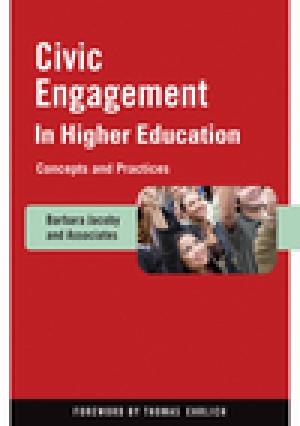
Numerous studies have chronicled students lack of trust in large social institutions, declining interest in politics, and decreasing civic skills. This book is a comprehensive guide to developing high-quality civic engagement experiences for college students. The book defines civic engagement and explains why it is central to a college education. It describes the state of the art of education for civic engagement and provides guidelines for designing programs that encourage desired learning outcomes. In addition, the book guides leaders in organizing their institutions to create a campus-wide culture of civic engagement. (From the Publisher)
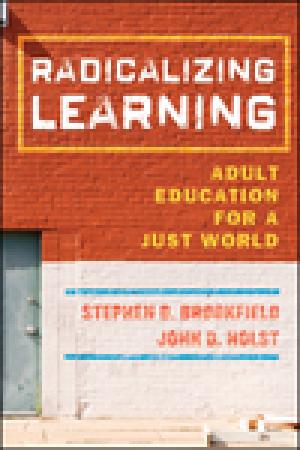
Praise for Radicalizing Learning This is a book that is so interesting that I had trouble putting it down. It is well written; there is new material; it articulates familiar concepts in such novel ways that your thought patterns get hijacked reading it. Adult learning and its processes are examined from a socialist perspective with a focus on social justice. Stephen Brookfield and John Holst have written a monumental text in the field of adult education. It is a bold, ambitious book, beautifully written and uncompromising in its social justice agenda. It is sure to become a classic in the field. This book offers new readings of the theory, politics, policy, and practice of radical adult education and learning where people's lives are understood as complex and interrelated matters. Brookfield and Holst's poetics and deeply human prose sound rebellious; the authors confront some of the main radical trends in the field of adult education including critical theory, transformative learning, and popular education. (From the Publisher)
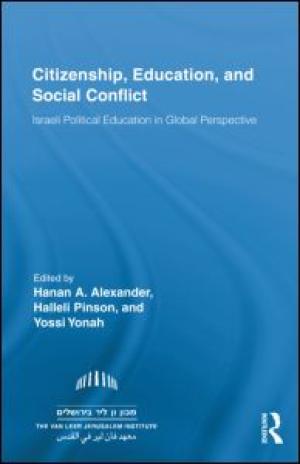
This volume provides new perspectives into the challenges of citizenship education in the age of globalization and in the context of multicultural and conflict-ridden societies. It calls on us to rethink the accepted liberal and national discourses that have long dominated the conceptualization and practice of citizenship and citizenship education in light of social conflict, globalization, terrorism, and the spread of an extreme form of capitalism. The contributors of the volume identify the main challenges to the role of citizenship education in the context of globalization, conflicts and the changes to the institution of citizenship they entail and critically examine the ways in which schools and education systems currently address – and may be able to improve – the role of citizenship education in conflict-ridden and multicultural contexts. (From the Publisher)
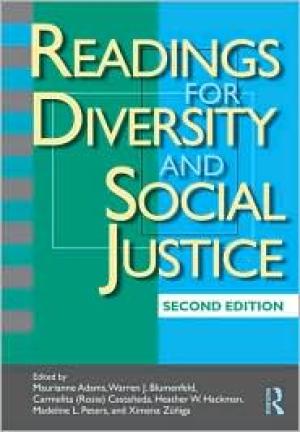
For over ten years, Readings for Diversity and Social Justice has been the go-to anthology for the broadest possible coverage of issues related to identity and oppression from a social justice perspective. This highly-anticipated second edition breaks even further ground, boasting over 40 more readings than previously available, updated and original section introductions, and three entirely new chapter sections on Religious Oppression, Transgender Oppression, and Ageism/Adultism. As with the first edition, each chapter section is divided into Contexts, Personal Voices, and Next Steps. The first two parts provide vivid portraits of the meaning of diversity and the realities of oppression. The third part challenges the reader to take action to end oppressive behavior and affirm diversity and social justice. Added new features to this edition include: * Over 130 readings, many new and updated, including three entirely new sections. * A Table of Intersections that enables readers to identify all selections that treat issues of race, religion, gender, sexuality, disability, class, and age, beyond those in designated topical chapters. * An all new companion website with additional resources, further suggested readings, and teaching materials is also available. Offering over one-hundred and thirty selections from some of the foremost scholars in a wide range of fields, Readings for Diversity and Social Justice, Second Edition is the indispensible volume for every student, teacher, and social justice advocate. (From the Publisher)
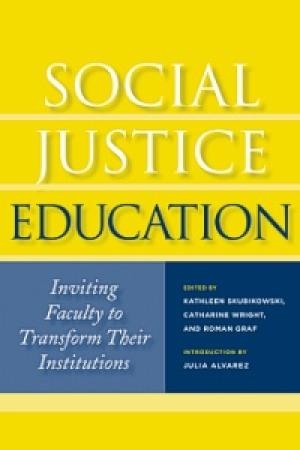
This book grew out of a project – involving deans and directors of teaching centers and diversity offices from six institutions – to instigate discussions among teachers and administrators about implementing socially just practices in their classrooms, departments, and offices. The purpose was to explore how best to foster such conversations across departments and functions within an institution, as well as between institutions. This book presents the theoretical framework used, and many of the successful projects to which it gave rise. Recognizing that many faculty have little preparation for teaching students whose backgrounds, culture, and educational socialization differ from theirs, the opening foundational section asks teachers to attend closely to their and their students’ relative power and positionality in the classroom, and to the impact of the materials, resources and pedagogical approaches employed. Further chapters offer analytical tools to promote inquiry and change. The concluding sections of the book demonstrate how intra- and inter-institutional collaborations inspired teachers to rise to the challenge of their campuses’ commitments to diversity. Among the examples presented is an initiative involving the faculty development coordinator, and faculty from a wide range of domains at DePauw University, who built upon an existing ethics initiative to embed social justice across the curriculum. In another, professors of mathematics from three institutions describe how they collaborated to create socially just classrooms that both serve mathematical learning, and support service learning or community-based learning activities. The final essay by a student from the Maldives, describing how she navigated the chasm between life in an American college and her family circumstances, will reinforce the reader’s commitment to establishing social justice in the academy. This book provides individual faculty, faculty developers and diversity officers with the concepts, reflective tools, and collaborative models, as well as a wealth of examples, to confidently embark on the path to transforming educational practice. (From the Publisher)
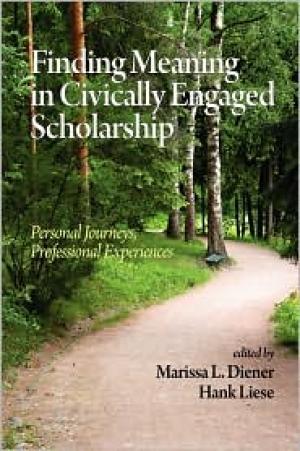
From the Pubisher The essays in this volume are a collection of reflective narratives, rather than traditional scholarly treatises. The book is divided into two parts. The first part describes our individual journeys as each of us found our way to civically engaged scholarship and came to see it as critical to our academic endeavors and identity. This section also highlights the interdisciplinary nature of our work as we discuss our journeys through our own disciplinary lenses. The second part presents detailed examples of our civic engagement, including service-learning classes, community based research projects, and creation of community service-learning spaces. These chapters provide a varied picture of the available avenues for civic engagement for students and faculty in a higher education setting. We provide sufficient details of our projects and classes to enable replication. The book concludes with a discussion of civic engagement as it is defined in the literature. The conclusion also discusses institutional factors that support and promote civic engagement as well as the importance of community involvement in service learning. Five common themes that emerged across the chapters are described. These themes include the use of service learning and civic engagement as an effective pedagogy, the relationship between civic engagement and political activism, the importance of partnership and collaboration, the meaning found in civic engagement, and the challenges of civically engaged work.
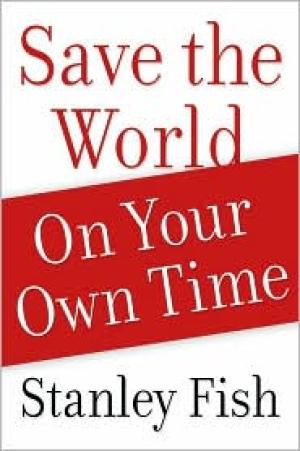
What should be the role of our institutions of higher education? To promote good moral character? To bring an end to racism, sexism, economic oppression, and other social ills? To foster diversity and democracy and produce responsible citizens? In Save the World On Your Own Time, Stanley Fish argues that, however laudable these goals might be, there is but one proper role for the academe in society: to advance bodies of knowledge and to equip students for doing the same. When teachers offer themselves as moralists, political activists, or agents of social change rather than as credentialed experts in a particular subject and the methods used to analyze it, they abdicate their true purpose. And yet professors now routinely bring their political views into the classroom and seek to influence the political views of their students. Those who do this will often invoke academic freedom, but Fish argues that academic freedom, correctly understood, is the freedom to do the academic job, not the freedom to do any job that comes into the professor's mind. He insists that a professor's only obligation is "to present the material in the syllabus and introduce students to state-of-the-art methods of analysis. Not to practice politics, but to study it; not to proselytize for or against religious doctrines, but to describe them; not to affirm or condemn Intelligent Design, but to explain what it is and analyze its appeal." Given that hot-button issues such as Holocaust denial, free speech, and the Israeli-Palestinian conflict are regularly debated in classrooms across the nation, Save the World On Your Own Time is certain to spark fresh debate-and to incense both liberals andconservatives-about the true purpose of higher education in America. (From the Publisher)
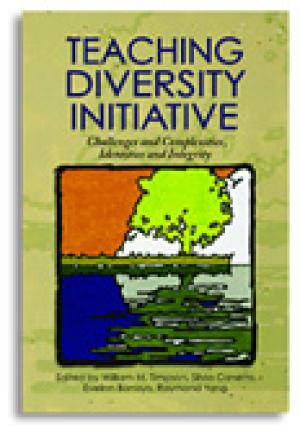
DIVERSITY IN HIGHER EDUCATION both in the student body and the faculty is an idea much heralded in academia. But how do committed institutions, faculty, and staff plan for diversity, teach it, and find opportunities within courses to expand on the canon of their discipline? How can diversity issues be dealt with in a sensitive and yet exciting manner? The contributors to this volume asked themselves those questions, joined together with like-minded colleagues, and met as a team--exploring their own experiences, sharing what their lives had taught them, and trying to make sense of difficult and sometimes conflicting ideologies. Together, the faculty and staff at Colorado State University created environment for each other to search, question, and then take their new awareness out into the greater community. This is a compilation of their thoughts and struggles as they explored the complexities of a diverse world and institution. It is a search for ways in which identify is preserved and celebrated, a search that supports integrity for all. This volume shares a portion of what they learned and shared. It can serve as a starting point for discussions on other campuses eager to move forward with diversity initiatives. (From the Publisher)
TTR Teaching Tactic: analysis of effective use of case studies for teaching ethics.
Teaching Tactic: role play helps students learn how far a custodian's salary goes.